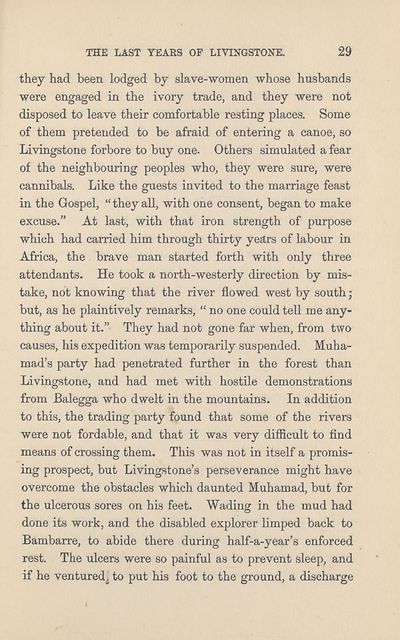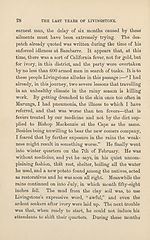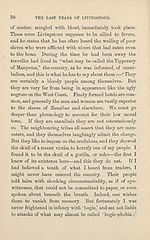Download files
Complete book:
Individual page:
Thumbnail gallery: Grid view | List view

THE LAST YEARS OF LIVINGSTONE.
29
they had been lodged by slave-women whose husbands
were engaged in the ivory trade, and they were not
disposed to leave their comfortable resting places. Some
of them pretended to be afraid of entering a canoe, so
Livingstone forbore to buy one. Others simulated a fear
of the neighbouring peoples who, they were sure, were
cannibals. Like the guests invited to the marriage feast
in the Gospel, “they all, with one consent, began to make
excuse.” At last, with that iron strength of purpose
which had carried him through thirty years of labour in
Africa, the brave man started forth with only three
attendants. He took a north-westerly direction by mis¬
take, not knowing that the river flowed west by south;
but, as he plaintively remarks, “ no one could tell me any¬
thing about it.” They had not gone far when, from two
causes, his expedition was temporarily suspended. Muha-
mad’s party had penetrated further in the forest than
Livingstone, and had met with hostile demonstrations
from Balegga who dwelt in the mountains. In addition
to this, the trading party found that some of the rivers
were not fordable, and that it was very difficult to find
means of crossing them. This was not in itself a promis¬
ing prospect, but Livingstone’s perseverance might have
overcome the obstacles which daunted Muhamad, but for
the ulcerous sores on his feet. Wading in the mud had
done its work, and the disabled explorer limped back to
Bambarre, to abide there during half-a-year’s enforced
rest. The ulcers were so painful as to prevent sleep, and
if he ventured^ to put his foot to the ground, a discharge
29
they had been lodged by slave-women whose husbands
were engaged in the ivory trade, and they were not
disposed to leave their comfortable resting places. Some
of them pretended to be afraid of entering a canoe, so
Livingstone forbore to buy one. Others simulated a fear
of the neighbouring peoples who, they were sure, were
cannibals. Like the guests invited to the marriage feast
in the Gospel, “they all, with one consent, began to make
excuse.” At last, with that iron strength of purpose
which had carried him through thirty years of labour in
Africa, the brave man started forth with only three
attendants. He took a north-westerly direction by mis¬
take, not knowing that the river flowed west by south;
but, as he plaintively remarks, “ no one could tell me any¬
thing about it.” They had not gone far when, from two
causes, his expedition was temporarily suspended. Muha-
mad’s party had penetrated further in the forest than
Livingstone, and had met with hostile demonstrations
from Balegga who dwelt in the mountains. In addition
to this, the trading party found that some of the rivers
were not fordable, and that it was very difficult to find
means of crossing them. This was not in itself a promis¬
ing prospect, but Livingstone’s perseverance might have
overcome the obstacles which daunted Muhamad, but for
the ulcerous sores on his feet. Wading in the mud had
done its work, and the disabled explorer limped back to
Bambarre, to abide there during half-a-year’s enforced
rest. The ulcers were so painful as to prevent sleep, and
if he ventured^ to put his foot to the ground, a discharge
Set display mode to:
![]() Universal Viewer |
Universal Viewer | ![]() Mirador |
Large image | Transcription
Mirador |
Large image | Transcription
| Antiquarian books of Scotland > Scotland/Scots > Last years of Livingstone > (37) |
|---|
| Permanent URL | https://digital.nls.uk/136057606 |
|---|
| Description | Thousands of printed books from the Antiquarian Books of Scotland collection which dates from 1641 to the 1980s. The collection consists of 14,800 books which were published in Scotland or have a Scottish connection, e.g. through the author, printer or owner. Subjects covered include sport, education, diseases, adventure, occupations, Jacobites, politics and religion. Among the 29 languages represented are English, Gaelic, Italian, French, Russian and Swedish. |
|---|

